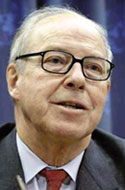FCNNEWSSOURCE

(FinalCall.com) – The Iraqi war was planned in advance and is sending a wrong message, according to Hans Blix, the chief UN inspector who was sent to verify the current state of Iraq’s biological, chemical and nuclear development programs. The U.S. invasion of Iraq by coalition forces brought the work of his team of specialists to an abrupt halt.
“There is evidence that this war was planned well in advance,” Mr. Blix said in a recent interview with Spanish daily El Pais. “I now believe that finding weapons of mass destruction has been relegated, I would say, to fourth place. Today, the main aim is to change the dictatorial regime of Saddam Hussein.”
Mr. Blix also believes that other countries are receiving the message that “if you let in the inspectors, like Iraq did, you get attacked.” He pointed to the announcement by North Korea that it would fully mobilize its forces if the U.S. used the UN Security Council’s discussion of its nuclear program as a “prelude to war.”
Mr. Blix charged the U.S. government with the “fabrication” of evidence, referring to the American claim that Iraq tried to buy uranium from Niger, an African nation. As U.S. allegations grew more transparent and eventually proved false, he says, even Washington became less convinced of the possibility that the Iraqi government possessed weapons of mass destruction.
“You ask yourself a lot of questions when you see the things they did to try and demonstrate that the Iraqis had nuclear weapons, like the false contract with Niger,” he said.
Regretting that the route of inspections was not allowed to take its course in curbing Iraqi weapons development, the chief inspector considered the war “a very high price to pay in terms of human lives and the destruction of a country.”
Meanwhile, U.S. Army General Ben Freakly announced that 11 containers buried near an artillery ammunitions plant in southern Iraq could be dual-use chemical and biological laboratories.
Members of the 101st Airborne in Karbala, according to media reports, found the metal containers, which could be attached to semi-trucks or railway cars. More than 1,000 pounds of documentation were also found at the site, Gen. Freakly said, but there was no evidence of weapons.
There have been previous reports of chemical weapons that turned out to be false alarms, including a site about 60 miles south of Karbala where military officials initially believed they had discovered a nerve agent. Testing showed the substance was a high-grade pesticide.
Mr. Blix had said that his team would be ready to re-enter Iraq when the war was over to pick up where they left off.
Mohamed El Baradei, head of the International Atomic Energy Agency, who was part of the inspection team, told a German newspaper recently that there was the risk of U.S. troops playing judge and jury in their own hunt.
“To test these mysterious substances only at American laboratories is not sufficient. Only the UN, not the U.S., has the authority to remove banned arms,” he said.
Geoff Hoon, the UK Defense Secretary, speaking to BBC Radio’s The World, said he was almost certain that weapons of mass destruction remain hidden in Iraq; nevertheless, he said a watchdog needs to double-check U.S. weapons finds.
It is “important that we have an objective source of verification,” he said.
“Whether that should be UNMOVIC (the UN weapons inspectors), which wasn’t particularly successful in its time in Iraq, or whether it should be some other international body or some other country that has a tried and tested reputation for objectivity in this area, I think we are undecided.
“But I accept the principle, which is that we do need to have some extraneous authority to monitor what is happening,” he said.












